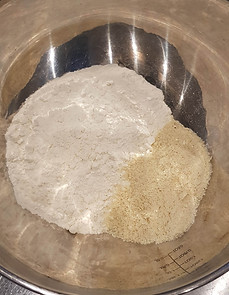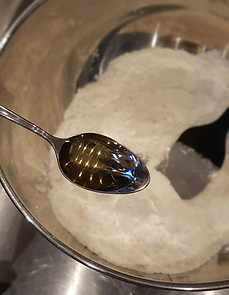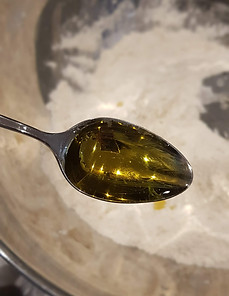
Kimchi Pancake (Vegan)









You know how pancakes can differ by countries. Some countries they make the pancakes quite thick and sponge like then another paper thin and crispy.
Well in Korea, we do all ranges of it but when it comes to vegetable pancakes, we do focus more in thiness of it and keeping the ecges around the pancakes to be crispy. So for Kimchi Pancake vegan version, I want to share how it can be done.
Serves 4,
Ingredients:
-
3 Flour : 1 Almond flour
-
1 tea spoon Walnut oil
-
1 tea spoon Grape seed oil
-
1 tea spoon Olive oil
-
1 tea spoon Sesame oil
-
1 tea spoon Soy sauce
-
4 Tablespoon Kimchi or more
-
2 Table spoon Kimchi brine or more
-
1 or 2 cup of filtered water
-
a pinch of salt
-
4 table spoon of chives chopped
Directions:
-
First in a mixing bowl, add the flour, Almond oil and a pinch of salt then mix them up.
-
Add walnut oil, give a good stir around the flour. Add each oil and each time give a good stir so all oil drops can react well with flour mix.
-
Once the flour mix and oil mix is done, add Kimchi and give another good stir so that the cabbage leaves can be well coated around with the mix.
-
Add Kimchi brine to bring the mix and let it react with the flours.
-
Bit by bit add water to the mix until it is mildly thicker than general pancake batter consistancy.
It's important that flour mix is reacting with Kimchi chunks and brine. I understand with the normal pancake batter making some recipe suggests to let the batter rest for a bit. With Kimchi Pancake, you don't neccessarily have to. The microorganisms in Kimchi will react with flour so the longer you wait, the more flour to be broken down.
And this is why using well-aged Kimchi in this recipe is the key.
If you are let the batter rest, you might want to start with add less water at the end.
Cooking guide: Use spatula that has no holes
-
1. Heat up the pan with vegetable oil. with medium heat. At first, start with a generous amount of oil so the pan is well coated with the oil. Once you see the oil has obsorbed away into the pan, then add a bit more oil before you put the pancake batter.
-
Using a ladle, add 1 ladle of batter, and add the next ladle of batter forming a small circle. At this point the batter can be thick but move your pan around so the batter can spread out.
-
Sprinkle chopped chives.
-
Once you can see the bottom of the pancake is cooked, as you can see ythe edge of the pancake begin to change colour, you can move the pancake to see if it is cooked, off the pan, not sticking to anything.
-
With a spatula, pick up your pan, both arms moving togather to set your rythem to flip the pancake,
-
Right away gently press on the pancake with spatula all around.
-
Seeing the uncooked pancake batter squeez out on the edge of pancake is what you want to see.
-
As you wait, you continue to press on the pancake all around to make sure that it is at good thin size.
-
Also measure the top, if it had been flipped a bit sooner, then flip it one more time.
-
Chives sprinkle being the top, slide the pancake onto a place and enjoy!